12 Marketing Automation Hacks That Will Surprise You and Boost Your Business Growth
Automate or die.
It might sound dramatic, but it’s the digital reality we live in.
If you want to leave your mark on this world as a blogger, virtual entrepreneur or online startup – you need to automate a big chunk of your marketing. Because if you don’t you’ll be left behind, and quickly become insignificant.
Whether it’s as basic as pre-scheduling a few social media messages, or as complex as constructing a fully-fledged email marketing funnel – automation is here to stay, and everyone is doing it.
In fact, the number of organizations using marketing automation has increased 11 times in the last 5 years.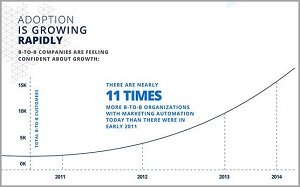
The good news is you haven’t missed the boat… Yet.
Despite this increase in marketing automation adoption among businesses, as much as 62% of companies don’t use advanced automation features, and limit themselves to basic email marketing and customer relationship management.
While these companies stagnate, marketing automation technology continues to develop, offering you a unique competitive opportunity.
If you want to be a leader in this space, the rest of this post will help. Below I reveal 12 marketing automation hacks that you (and your competitors) have most likely never heard of before.
Let’s get started.
Note: Each Marketing Automation provider offers a different array of features. This post is based on solutions provided by SALESmanago Marketing Automation, one of the largest European martech companies. Find out more info at www.salesmanago.com
Table of Contents
1. Email anonymous visitors on your website
Most of your website visitors aren’t in your CRM software yet.
They scan through a couple of pages and then leave, without giving you their contact information.
So how can you reach them now?
Smart marketing automation software allows you to use cookie matching integration with external email database providers (such as Remintrex) to send personalized messages to these website visitors.
Sounds like magic? Yes. But now it’s a reality.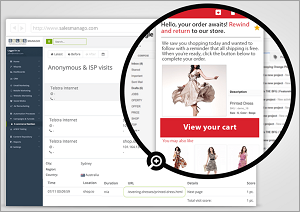
2. Recover abandoned carts with Facebook Messenger
69% of shopping carts on eCommerce stores are abandoned. To address this problem, marketing automation software has traditionally sent email blasts to recover these lost sales. But what if someone is unresponsive over email?
Now you can approach them via Facebook Messenger, by delivering your potential customer a list of products they added to their shopping cart, and the option to go back to finalize the transaction.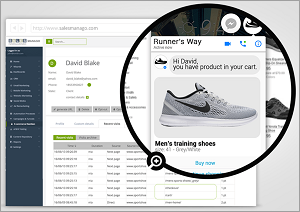
3. Send personalized discount emails
Perhaps your customer wanted a product, but the price scared them off. It happens often, where purchase motivation is high, yet money is the problem.
To make your customer’s life easier, you can send an automatic email when the price of the product they viewed, but haven’t purchased, drops or is discounted. You are capitalizing on already established purchase intent.
These personalized dynamic emails get 400% higher open and click through rates.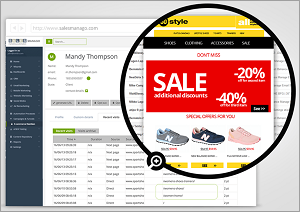
4. Tailor Facebook Ads based on offline behavior
Do you have a physical store? If you do you will find this tip essential.
You can now integrate your Facebook Ads with marketing automation systems that include offline data such as; information about purchases, info from iBeacons etc.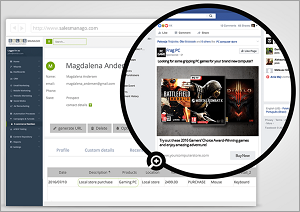
5. Build intuitive customer behavioral profiles
Traditional web analytics are based on what the user clicks on – and today that method is outdated.
Why?
Because now customers can check product details without even visiting a product page. For example, some e-shops have all the crucial details listed on the product category page. When your website is constructed that way, traditional click-based tracking won’t tell you much about the content that visitor actually consumed.
These days you can use advanced monitoring options to see which products a customer has seen, for how long they have seen them, and then use this information to build full behavioral profiles about the most interesting products for each person.
You can also see how far down a person has scrolled on a page or whether they have seen a given form.
This analysis allows you to indicate patterns in customers’ behavior. For example, customers who buy product A, also view product B.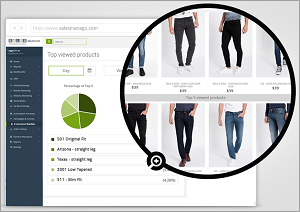
6. Collect leads with intelligent contact forms
With marketing automation you start to collect huge amounts of information about the anonymous visitors on your website.
Converting these visitors using traditional contact forms can be a drawn-out process. But you can speed up this process by using personalized lead generation forms and landing pages which ask just for their e-mail address or phone number. In this case you don’t need to ask for their interests because you already know them from this person’s website activity.
These personalized contact forms get over 1000% higher conversions than typical contact forms.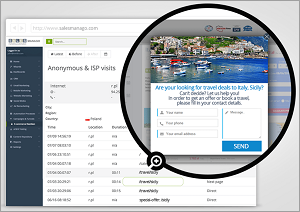
7. Use customer data to display ads
Are you using ad networks to display branding or remarketing? Well, everybody is doing that. But with marketing automation you can greatly expand the possibilities of ad networks by using transactional data from your CRM system.
Let’s say you still haven’t received a payment and the customer doesn’t respond to your emails or calls. This might sound brutal but you can actually use this information about overdue payments to display ads on the Financial Times website.
Also, for B2B sales processes you can use ad networks as a supporting tool for your lead nurturing campaigns.
8. Use behavioral scoring in your recruitment process
Marketing automation not only helps for streamlining marketing and sales. You can also streamline your recruitment process by scoring your candidates – the same way you score your leads.
If a candidate sends an application, start a lead nurturing campaign and build their behavioral profile based on articles and information they read on your website.
Distinguish between those most active and willing to prepare best for the interview and those who didn’t bother to do anything.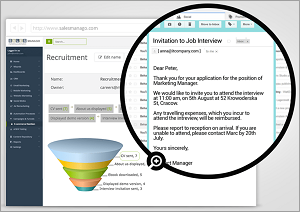
9. Never ask for information you already have
Once you have got contact data from your potential customer, you no longer need to force them to send the same information again in contact forms or popups on your site. However, you can still present contact forms – just ask for different data this time.
Marketing automation can identify the user and shape the contact form in such a way that it asks for information that’s not in the system. For example, when the contact is monitored and you have their email address, the next form will only contain the box for a phone number and name to fill in.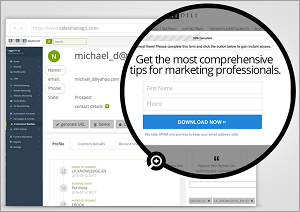
10. Adjust discount levels based on engagement
You can build loyalty programs that adjust the prices displayed on your website, and in your emails, according to a customers’ activity.
In other words, different prices are displayed to different customers based on how many times they have viewed a product, or the frequency with which they have purchased.
You can also send additional discount codes to those who have not been engaged for a long time to activate them.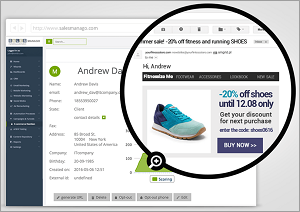
11. Identify important product categories with segmentation
Many marketers use the segmentation technique and add tags to a given contact when they show an interest in a product category. The problem is, customers can be interested in various categories on your website. Flat segmentation, which tells you only the names of those categories, won’t guarantee the best offer targeting.
You can go deeper with this customer segmentation and score each segment basing on how often a user browses products from a given group. At the end of the day, your marketing automation can tell which category is more relevant to a given recipient. It will help you avoid the trap of meaningless tagging, when one user has so many tags that you no longer know which offers would be most relevant.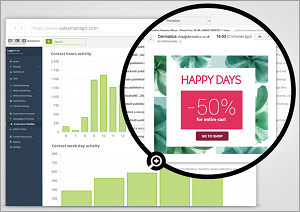
12. Deliver emails at the most suitable time
Have you ever wondered which is the best day in the week to send out your newsletter? Now you don’t have to.
Based on the analysis of an individual contact’s online activity, marketing automation can deliver your weekly newsletter at the best day and time, individually to each contact in your database.
You can see as much as a 200% increase in open and click-through rates just by using this one marketing automation hack.
Wrap up
Without a doubt marketing automation is evolving as we speak.
The opportunity to automate, optimize and scale your online business is ripe for the picking.
But it won’t be long until that opportunity dilutes… Just like every other trend we see in digital marketing. Everyone starts doing it and it becomes less effective.
So if you want to leave your very own digital footprint on this world, now is the time to take action and marketing automation is your ticket to making it happen faster.
About the author: Jeff Bullas
 Jeff is an entrepreneur, blogger, author, marketer and speaker and works with personal brands and business to optimize online personal and company brands with emerging technologies, content, social media technologies and digital marketing. He has spent most of his career involved with information technologies, telecommunications and the web.
Jeff is an entrepreneur, blogger, author, marketer and speaker and works with personal brands and business to optimize online personal and company brands with emerging technologies, content, social media technologies and digital marketing. He has spent most of his career involved with information technologies, telecommunications and the web.



